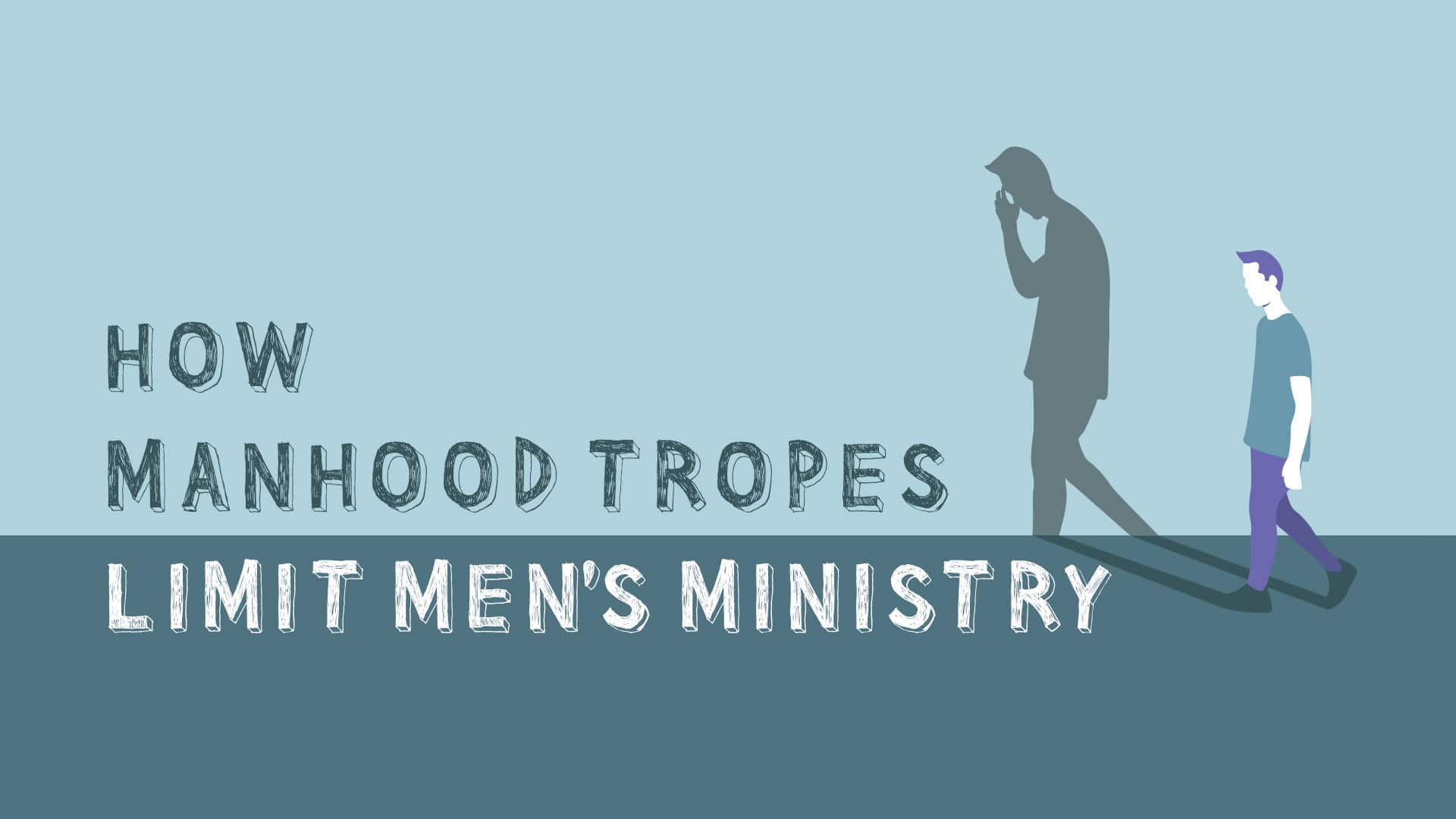We see male archetypes everywhere, each subtly held up as a standard to live by. It’s not just the culture leaving guys confused; it can also be the church. Here’s how manhood tropes limit men’s ministry—and how you can break the cycle.

By the Man in the Mirror Team
We spoke with a young man who had a remarkable story.
After briefly attending college, he joined the military and served for five years. Now he is out and has landed his first civilian job.
Yet, it was obvious in talking to him that he has had very few—if any—male role models who could show him what it meant to be a real man. His dad was not really involved in his life and his mom, while well-meaning, had trouble providing emotionally, economically, and spiritually.
So here he sits, in his mid-twenties, wondering what a man really is and how to become one.
You might be thinking, What’s so remarkable about that? The remarkable thing is that his story is not remarkable at all.
We’ve created a culture where what should have been the exception—young men drifting through life without mentors, training, or direction—has instead become the norm.
Manhood Tropes
Consider how confusing it can be for men today. They see various tropes of manhood paraded before them. And each one is subtly held up as a standard to live by.
Do you recognize any of these male archetypes?
Success Man. This image promises that the key to happiness is getting your act together and doing well in every area of your life. Get a great job, drive a nice car, marry a beautiful woman—then you will be a real man.
Macho Man. In some versions of manhood, men have to be able to handle anything and everything. Nothing is too difficult for a real man; just grit your teeth and bear it. And don’t let anyone disrespect you. Real men are willing to do anything to preserve their reputation.
Outdoors Man. This perspective says that men today are too tame and timid. Real men hunt things and then eat their bloody hearts. The more you can be in the woods or on the water, and the more dangerous the activity, then the more that you will become a true man.
Sensitive Man. This image tells men that they need to always connect with people emotionally (especially women) and talk about their feelings. Tears are good; tears over a good book with some wine and cheese are even better.
Bumbling Man. It doesn’t take seeing many commercials or sitcoms to realize that men are incompetent and incapable. They can’t shop, cook, take care of the kids, or remember birthdays and anniversaries. But it’s okay because they are kind of cute and everything works out in the end.
Family Man. This idea emphasizes that real men are committed to their kids above all else. They don’t have time for themselves; they’re too busy carting their children across town from one activity to the next. Whatever their kids want, they get.
Religious Man. Men need to be committed to their churches and do what their pastors tell them to do. Playing by the rules is the most important thing in life. Being a man of integrity who is respected by others in the church is the ultimate biblical manhood.
Sports Man. Real manhood is derived from watching and playing sports. Being a loyal fan—even when your team gets worse year after year—is the highest badge of honor. Real men spend a lot of time arguing over and cheering for other guys who are actually doing something.
[click_to_tweet tweet=”It doesn’t take seeing many commercials or sitcoms to realize that men are incompetent and incapable. But it’s okay because they are kind of cute and everything works out in the end.” quote=”It doesn’t take seeing many commercials or sitcoms to realize that men are incompetent and incapable. But it’s okay because they are kind of cute and everything works out in the end.”]
I’m sure some of those seem familiar to you, and you could probably add a few more. No wonder men are so confused! But men aren’t just confused by the culture; they can also feel confused in the church.
Preacher, author, and professor Dr. Rhyne Putman wrote on Twitter about his own experience with this confusion amid the backdrop of men’s ministry:
“There was a time in my life when I truly felt out of place for not conforming to particular “masculine” stereotypes. I was never athletic and generally uninterested in sports as a kid.
“I ran the other direction when my dad tried to show me how to fix things. I couldn’t wait to go inside and play Nintendo. Honestly, I wish I had paid more attention. I’m still playing catch-up. I didn’t hunt or fish. The thought of it bored me (and still does).
“Though I tried to hide it well, I was shy, awkward, and uncomfortable around many boys who matured more quickly than me. In middle school and high school, I was always frustrated that the girls I liked were more into those guys than me. I was painfully oblivious to the girls who actually did like me during that awkward phase of my life.
“I get that we associate masculinity with physical activity, outdoor life, and mechanical competence. But that’s cultural conditioning. It took me a long time to feel comfortable in my skin as a movie geek, a lover of the arts, and someone who had a great passion for the written word. […]
“I recently learned from an adult friend how painful some of these struggles can be in the life of a local church when “men’s retreats” or “manly weekends” were associated with these activities he had little or no interest in participating in. I regret any pain I caused him by endorsing some of these activities as the way to be a biblical man. I learned that he felt marginalized by me—in some sense because I overcompensated for my own insecurities.
“If I had an urgent plea for a church speaking into a very different world for millennials and Gen-Zers: don’t buy into these gender stereotypes. […] We are a largely urban generation that does not know much of the world loved and appreciated by former generations. And that’s okay.
“God still loves me and calls me a son.”
Exclusive Men’s Ministry
As ministry leaders, we are constantly sending spoken and unspoken messages to the men who come our way. Through the activities we offer and the way we communicate, we may unintentionally send the message:
Only ____________ men are welcome.
We heard from a man who commented on our blog about his experience:
“I married in my late 30s and noticed how my social and church life changed instantly. Suddenly I was taken seriously, included, noticed! My years prior to marriage were full of frustration at being alone—sometimes lonely, but always isolated. There was no connection at church.”
Another man, Rick, recently emailed us:
“I am 61, 42 years in Christ, and, in some ways, just now stepping into manhood. Growing up with a dad who chose work over family and rules over relationship and an overprotective but perfectionistic mother, I entered adult life able to achieve academically and vocationally but highly passive and compliant. […]
“Over the last 20 years or so, God has led me through situations that walked me toward manhood. Even having made this journey, I find that I am still very much out of sync with most of what I see in men’s ministry today. Images of the point man or knights don’t resonate with me. I am not interested in sports or hunting or cars or the other touch points that men’s ministries offer. I know I am not alone in this. I recognize other men in the church who relate to the world more cognitively than physically.”
[click_to_tweet tweet=”Through the activities we offer and the way we communicate, we can unintentionally send the message that only ___________ men are welcome.” quote=”Through the activities we offer and the way we communicate, we can unintentionally send the message that only ___________ men are welcome.”]
In addition, here are a few other reasons given for disconnect that we’ve heard recently from men:
- There are zero activity-based opportunities for me to get to know other guys while having fun together; it’s ALL cerebral study.
- As a “blue collar” worker, it seems like the men’s ministry only tries to include the businessmen in the church. I feel out of place and unwelcome.
- It appears I’m too old to be useful; I’m not invited, not seen, and not valued by the men’s leaders. I believe I have experience and wisdom to offer, but no way to do it.
- I’d love to grow in my faith with some other men but everything the church offers is in the early morning. As a teacher, I have to be at work earlier than most and it rules me out completely.
- Our church only offers couples’ groups. As an unmarried man, I have nowhere to plug in.
- The women have things going on all the time and so the kids. But there isn’t anything for the men except landscaping, setup, and maintenance-related service projects around the church. It’s like we’re good for being workhorses and not much else.
Whether you’re a pastor, men’s leader, elder, or small group leader, pay attention to what you’re indirectly communicating to men about their value, purpose, and identity.
Are the messages and opportunities available for men in your church narrowing your mission field? Are they keeping some men isolated or on the fringe of the life of the church?
No Man Left Behind
The vision of Man in the Mirror is to see every man discipled. For this reason, our leadership training model is aptly named No Man Left Behind.
What might your church’s ministry model be called, if someone from the outside were to name it based on observation?
No Successful Man Left Behind?
No Married Man Left Behind?
No Young Man Left Behind?
No Athletic Man Left Behind?
No Retired Man Left Behind?
No Educated Man Left Behind?
No Republican Man Left Behind?
No Outdoors Man Left Behind?
No Respected Man Left Behind?
How might that observer fill in the blank, “Only _______________ men are welcome here”? If it’s with any adjective but “all,” you’re excluding some of the men you’re trying to reach.
So how do you avoid excluding men when it’s unintentional?
It’s not that you can’t offer interest-based activities (such as basketball or choir) and studies aimed at specific audiences (such as fathers or recovering addicts). You should! There is value in that and it will ultimately help get men involved in ways that are meaningful to them personally.
But here are three ways to avoid exclusive ministry—one related to your ministry message, one related to your ministry calendar, and one related to your ministry leadership:
- Message. Make sure your messaging is geared toward all men, with the focus on who they are in Christ as their primary source of identity.
- Calendar. Be deliberate about offering a variety of opportunities for guys to get engaged with others and grow in their faith, no matter where they are in their stage of life, circumstances, or spiritual journey.
- Leadership. If the leadership team also reflects diversity in these areas, it will go a long way in communicating #1 and it will make #2 an easier and more natural process.
If everything your church makes available to men is geared toward new Christians, outdoorsmen, guys with young families, or Saturday morning retirees, then you have an exclusive ministry model, and you will see limited involvement and limited life change.
What changes can you make to move your men’s discipleship efforts toward a more all-inclusive model?
THE BIG IDEA: Don’t allow the cultural archetypes of manhood to narrow the impact of your ministry. The goal of your discipleship efforts should be no man left behind.
Foundation for Real Manhood
The Bible clearly demonstrates that real manhood is grounded not in cultural expectations and norms, but in the gospel of Jesus Christ.
[click_to_tweet tweet=”The Bible clearly demonstrates that real manhood is grounded not in cultural expectations and norms, but in the gospel of Jesus Christ.” quote=”The Bible clearly demonstrates that real manhood is grounded not in cultural expectations and norms, but in the gospel of Jesus Christ.”]
Without the gospel, all of us are broken shells of what we should be. No matter what we pursue to satisfy our hearts, outside of the gospel it will never be enough.
But through the gospel, Jesus changes everything. When a man finds himself forgiven and healed in Christ, he is then free to pursue manhood—not from need or duty or obligation or insecurity, but rather as an overflow of who God has made him to be.
Men, if we must fill in the blank, let’s work together to see no man created-in-His-image left behind—which is every single one of us.
♦♦♦
[vc_widget_sidebar sidebar_id=”businesslounge-free-2″]







Brett, Patrick & Company.
Great article.
Talking and writing for men across the country–and listening to them–I can’t agree with you more. Churches are so stumped by this compartmentalization of men that they have stopped scheduling events. They are afraid of excluding anyone, judging anyone, or making anyone uncomfortable.
I think speakers and authors need to present ourselves as partners in the struggle and endorse all the way men are wired. Early in my writing career, I was the CBA DAD GUY. But I realized that label limited my outreach, so I expanded my ministry to the bigger idea of finding purpose, seeking God’s will, and building all relationships.
A generation ago women faced the challenge of being a mom, breadwinner, romantic partner, independent thinker, and cookie baker. As a result, women’s ministries today are still divided. Working women never go to afternoon teas. Single women are staying away from the church. MOPS groups show disdain (or envy) for career women. Any men’s ministry that just offers a variety of events that address “a variety of opportunities,” will never be unified. That idea is exclusionary. Men will only go to the limited number of events that speak to their current identity.
Yes, men’s pastors do need to back off if they find themselves over-emphasizing one of these archetypes to the exclusion of others. But at that same time, let’s celebrate our different passions and learn from each other.
A single or divorced guy should not be offended (or bored) if one of the talks at a retreat is on being a godly husband. Older guys can still laugh at stories about raising toddlers. Jokes about the local sports teams should not be avoided. It’s a good thing for a pastor to wipe tears once in a while at the pulpit or when discipling a man who’s hurting. On occasion, aren’t we all a “bumbling man”? It’s okay to schedule a golf (or fishing or businessmen’s) outing, but make sure it’s an outreach (not team building) and points to involvement on a broader level.
Leaders shouldn’t self-identify as any one archetype. We need to be self-deprecating. We need to admit that we all mess up and don’t have all the answers. We need to remind men that we’re all in this together and the guy next to you may be wired differently, but he is still in need to a friend, mentor, purpose, and Savior.
We are one body with many parts. And we need to say that out loud without diminishing any man’s contribution.
It’s actually dangerous to be in a small group of “like-minded” dudes. Affinity group ministry feeds into this problem of men feeling like outsiders. When you live in a silo, the only voices you hear tend to agree with what you already believe. A single persuasive voice can easily set the entire small group off course. (Not to get political, but that’s what happens when you only watch Fox News or only listen to NPR.)
Large men’s events are more important than ever so that guys can look around and see that the body of Christ is made up of all kinds of men. We can all learn from each other. Sharing in that diversity makes us all better dads, husbands, volunteers, work colleagues, neighbors, and evangelists.
Keep at it!
/jay
Thanks for sharing your insight, Jay! We are stronger together in our differences. “We are one body with many parts.” – Yes, amen.